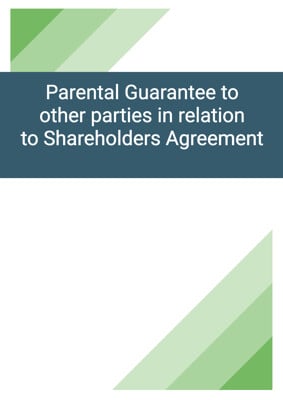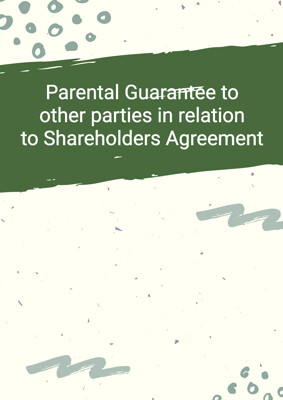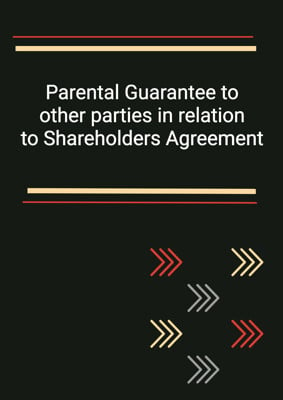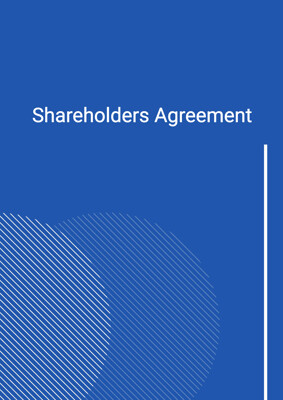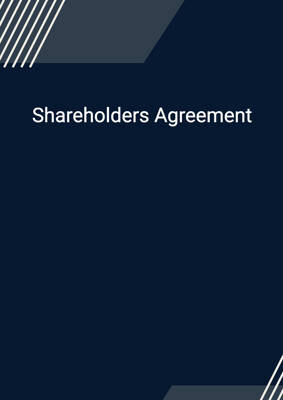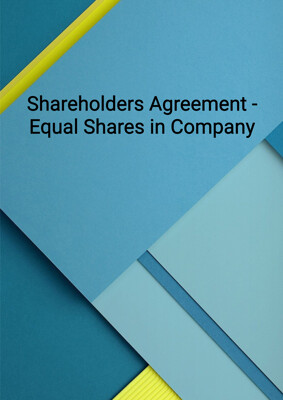How to Tailor the Document for Your Need?
01
Create Document
Fill in the details of the parties. You can click the "Fill with Member’s Information" button to complete it with information saved to your account.
02
Fill Information
Please fill in any additional information by following the step-by-step guide on the left hand side of the preview document and click the "Next" button.
03
Get Document
When you are done, click the "Get Document" button and you can download the document in Word or PDF format.
04
Review Document
Please get all parties to review the document carefully and make any final modifications to ensure that the details are correct before signing the document.
Document Preview
Document Description
The Shareholders Agreement - Equal Shares in Company is a legally binding document that governs the relationship between Party 1 and Party 2 as shareholders in a jointly-owned company. The agreement highlights the importance of forming the company and establishes the terms and conditions under which the parties will operate.
The document begins with an interpretation section that defines key terms used throughout the agreement. It clarifies the roles of Party 1 and Party 2 as directors of the company and outlines the share capital structure. The agreement also addresses the issue of further finance, specifying that the company should first approach its own bankers before seeking additional funding from the parties. It sets out the dividend policy, requiring the company to distribute a minimum percentage of its consolidated profit each year.
The agreement establishes the board of directors and outlines the process for appointing and removing directors. It specifies the quorum and voting rights at board meetings and requires notice and agenda to be provided to all board members.
Certain matters, referred to as reserved shareholder matters, require the prior approval of both Party 1 and Party 2. These matters include issuing shares, selling the company, altering the memorandum and articles, and borrowing by the company. The agreement also includes provisions regarding the transfer of shares, confidentiality, restrictions on the parties, termination, and dispute resolution.
The Shareholders Agreement - Equal Shares in Company is a comprehensive document that covers all aspects of the shareholders' relationship and ensures that both parties are aware of their rights and obligations. It provides a clear framework for the governance and operation of the company, promoting transparency and accountability.
How to use this document?
1. Incorporation: As soon as possible after signing the agreement, Party 1 and Party 2 should ensure the company is incorporated in the designated country as a limited company with the agreed name and authorized share capital.
2. Completion: Completion of the establishment of the company should take place within a specified timeframe after incorporation. Party 1 and Party 2 should subscribe for their respective shares and ensure that the company issues the shares and updates the register of members accordingly.
3. Capital and Finance: The company's share capital should consist of Party 1 shares and Party 2 shares in the agreed proportions. If the company requires further finance, it should first approach its own bankers. If finance cannot be obtained, Party 1 and Party 2 may provide finance in equal proportions.
4. Directors and Management: The board of directors should be constituted by directors appointed by Party 1 and Party 2. Each party should notify the other party and the company's secretary of any appointments or removals. The quorum for board meetings should be at least one director from each party. Each director should have one vote, and absent directors may nominate alternates.
5. Reserved Shareholder Matters: Certain matters require the prior approval of both Party 1 and Party 2. These include issuing shares, selling the company, altering the memorandum and articles, and borrowing by the company. Approval can be given in writing or by unanimous resolution at a general meeting of shareholders.
6. Transfer of Shares: If either party wishes to sell or dispose of any shares, they must give notice to the other party. The continuing party has the right to purchase the shares at the proposed price. If no agreement is reached, the fair price will be determined by the auditors. If the continuing party does not purchase the shares, the selling party may sell them to a third party purchaser approved by the continuing party.
7. Confidentiality: Both parties must keep confidential any information acquired in relation to the company or the other party's business. This obligation does not apply to publicly available information or information already in possession of the receiving party.
8. Restrictions on the Parties: Neither party nor any member of their respective groups may engage in any competing business during the term of the agreement, except for certain permitted activities.
9. Term and Termination: The agreement has a minimum term and will continue from year to year unless terminated by either party with prior notice. Termination may also occur in the event of a breach, insolvency, or change in control. In certain circumstances, the terminating party may require the affected party to sell its shares.
10. Supremacy of the Agreement: Both parties must use their votes and other means to ensure the agreement is duly performed and that the provisions of the agreement prevail over the memorandum and articles of the company.
11. Costs: The costs of incorporating the company are borne by the company. Each party is responsible for its own costs related to the preparation and execution of the agreement.
12. No Partnership or Agency: The agreement does not create a partnership or agency relationship between the parties. Neither party can commit or bind the other party without consent.
13. Entire Agreement: The agreement, along with any other agreements entered into on completion, constitutes the entire agreement between the parties and supersedes any previous agreements or understandings.
14. Mutual Consultation and Goodwill: The parties agree to consult on matters affecting the development of the business and to act in good faith towards each other.
15. Assignment: The parties are not entitled to assign the agreement or grant any rights or interests in it, except for the transfer of shares in accordance with the agreement.
16. Conditions Precedent: If specified, completion of the agreement is subject to certain conditions precedent. The parties must use reasonable endeavors to fulfill these conditions before completion.
17. Amendment: Any variation of the agreement must be in writing and signed by the parties. Variations do not constitute a general waiver of any provisions and do not affect rights, obligations, or liabilities that have already accrued.
18. No Rights of Third Parties: The agreement does not confer any rights on third parties to enforce its terms.
19. Dispute Resolution: Any disputes arising from the agreement will be subject to the jurisdiction clause specified in the agreement.
20. Notices and Service: Notices under the agreement must be in writing and served by email, hand delivery, or post. The addresses for service are provided in the agreement, and any changes must be notified in writing. The agreement also specifies the language of notices and service of legal proceedings.
This guidance provides a summary of the key steps and provisions in the Shareholders Agreement - Equal Shares in Company. It is important to review the full agreement and seek legal advice to ensure compliance with all terms and conditions.
Not the right document?
Don’t worry, we have thousands of documents for you to choose from:

